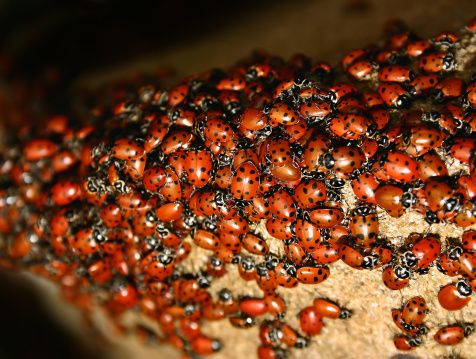BLOG / DON'T LET LADYBUGS BECOME YOUR LANDLORD
As August winds down and the summer begins to fade, ladybugs increase in frequency around the home. 
Although they may be cute to look at, ladybugs can often gather in large volumes and quickly create an infestation in your home. We’re here to shed some light on how ladybugs survive, and the best way to prevent a home infestation.
Ladybugs, also known as lady beetles or ladybirds, are a small type of beetle, commonly found with reddish orange shells with black antennae, legs, and heads. With an approximate lifespan of 2 to 3 years, ladybugs survive the winter months by overwintering (also known as hibernating) and consuming their body fat for nutrients.
A brief history on the ladybug:
Ladybugs are considered one of the most beneficial beetles, as aphids (plant lice) are their favourite food. In fact, they are known to feed on more than 50 species of aphids, and this is why they were originally brought to America. In 1970, ladybugs were imported from Asia to control crop-eating insects. Today, there are over 450 species of ladybugs in North America. Of those 450 types of ladybugs, only three of them feed on plants. You might have noticed these ones in your garden feeding on your vegetables, shrubs and flowers.
Ladybugs are very good at surviving our harsh Canadian winters. They typically do this by overwintering in a warm place away from the elements of the outdoors, and this is how you might end up with ladybugs in the house. In the fall and winter, you will notice them gathering in large numbers on the hunt for a place to spend the winter. They are attracted to buildings and homes with sunny exposures, and will sneak into any crack, crevice or opening to survive the winter.
You will notice the presence of a large number of ladybugs on and around buildings. If you are seeing a few ladybugs, it’s likely that there are a lot more hidden within your house that you can’t see. They are very active during the fall, and on warm winter days you will see ladybugs in the house.
A ladybug infestation will usually occur in the late summer and early fall.
Ladybugs release pheromones like a perfume to attract other ladybugs, and this scent can be detected up to 0.4 kilometres away. It can also remain year after year on the outside of your house. If you have ladybugs in the house, these pheromones can also stay on the inside of your walls.
Fix holes in screen doors and windows.
Make sure the caulking around doors and windows is secure.
Seal any cracks or crevices along the foundation of your home.
Plug any holes in your roofing, vents or attic walls.
Sweep or vacuum them up, as ladybugs are known to release a yellowish secretion when they are disrupted. This yellowish substance can be foul smelling and stain some surfaces.
Interesting facts about ladybugs:
A ladybug flaps its wings 85 times a second when it flies.
Ladybugs chew from side to side not up and down.
Over its lifetime, a ladybug can consume as many as 5,000 aphids.
Thousands of ladybugs may gather in the same place to hibernate.
The scientific name for a ladybug is a coccinellidae, which means ‘little red sphere’.
Despite the name, ladybugs can be either female or male. Although they look very similar, female ladybugs are usually larger than males.
NO RELIANCE ON PESTICIDE PRODUCTS - LEARN ABOUT OUR GREEN PEST MANAGEMENT SYSTEM